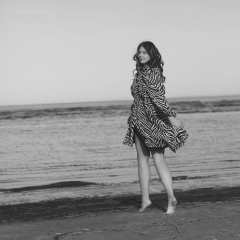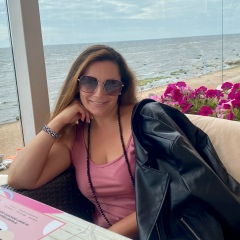Если же писать развернутый отзыв, то в нем, наверно, брюзжания окажется больше, чем похвалы. Потому что я не мастак писать про музыку. И когда в ней все хорошо, то мне нечего сказать, просто "О!". Но зато если я замечаю недостатки, то их я могу щепетильно раскладывать по полочкам.
Так вот, в Classic Enigma Show классики Энигмы оказалось, как это ни странно, процентов 50, и это было "О!". И что я тут могу сказать? Эта магическая, медитативная музыка заставляла отрываться от реальности и уплывать в космические дали.
Но были другие 50%. Чтоб объяснить, в чем подвох, расскажу вам немного истории Энигмы. Она появилась в 1990 году, когда композитору Майклу Крету внезапно явилась Муза. Может, на него снизошла энергия Вселенной, или попала молния, или кометы в космосе так встали, но - он внезапно заключил союз с Франком Петерсоном, женился на певице Сандре, купил виллу на острове в Средиземном море, и, не вылезая оттуда, ночи напролет писал музыку, которая стала известна миру как проект Enigma. Это была крайне андеграундно-инди-альтернативная вещь. С самого начала она позиционировалась как полностью инкогнито и чисто студийный проект. Правда, инкогнито нарушилось после первого же альбома, из-за того, что Петерсона и Крету стали преследовать правообладатели за использование григорианских сэмплов. Но перехода Энигмы из студийных в концертные проекты так и не произошло. А потом то ли муза улетела, то ли кометы сместились, но - во второй половине 90х Крету развелся с Сандрой, продал виллу на острове и ушел жить куда-то типа трейлера. Он не бросил писать музыку под маркой Enigma, но - что-то неуловимо изменилось. На мой сугубо личный вкус она стала обычной полуэстрадой-полуньюэйджем, довольно тягомотной и однообразной на вкус и ничем не выдающейся среди легионов подражателей Той Самой Первоначальной Энигмы, потрясшей мир. Крету стал лишь подражателем самого себя. Как будто он продолжал заниматься этим только для галочки (так как оброс контрактами со всякими студиями на N альбомов).
Настоящая Энигма - это первые три альбома. Сейчас, спустя 25 лет, я до сих пор помню наизусть перечень композиций в каждом из них. Потом был четвертый альбом, в котором прозвучали первые ласточки грядущей перемены. Он все еще мощный, но уже сливается в некое однообразие. Я не помню ни одного названия с него, хоть и помню некоторые мелодии. А это симптоматично. А последующие альбомы я просто прослушать до конца не смогла (всего их на данный момент порядка восьми).
Теперь про концерт. Во-первых, это не сама Энигма, а трибьют-коллектив. У меня от них осталось двойственное впечатление. Они, конечно, "постарались постараться". Они привели живой григорианский хор и живой оркестр (хоть и маленький); вокальные данные исполнителей великолепны. Но - первая осечка: трэк-лист концерта на половину состоял из "новой" Энигмы. Вторая осечка: они напирали на вокальные песни для одного солиста; даже с классических альбомов они отдавали предпочтение такому материалу. НО у классической-то Энигмы 90% мощи - в инструментальной составляющей! Вся соль пропадает; да и зачем было привлекать хор и оркестр, если им толком не дают разыграться? Третья осечка - звукорежиссер: он еще больше "утопил" хор и оркестр и еще сильнее старался выпячивать вокалистов. Ну и, наконец, сами вокалисты, точнее, то, как они себя вели: особенно ближе к концу, старались зажигать зал, стимулировали нас хлопать, махать руками и веселиться. Если это какие-нибудь молодые люди, которым лет по 20, то я могу им простить все их просчеты и некоторое любительство постановки; но если это более маститые музыканты, то им необходимо существенно поработать над ошибками и вообще подумать, их ли это дело. В конечном счете, у меня сложилось впечатление, что они хоть и взялись исполнять Энигму, но сам не поняли, за что же они взялись; и они не пытались погрузить нас в магию музыки Enigma, а пытались побыть звездами за счет этой музыки; они не пытались служить ей, а заставляли ее служить своим амбициям.
Пресловутая магия была - в первой половине концерта, где сконцентрировались вещи с классических альбомов, и где исполнители еще старались быть в образе, а не зажигать. И на самом деле, им не стоило удивляться, что пока музыка играет, все завороженно сидят и смотрят в потолок, и только по завершении разражаются аплодисментами. Такая она, Enigma. Когда она играет, слушателю не до людей. Вообще, не до мирского.
Еще я сделала для себя маленькое открытие: музыка классической Энигмы, оказывается, пригодна для рок-концерта в настоящем рок-клубе. Мне так и представлялись более мрачные и серьезные солисты в более суровых одеждах, совершающие на сцене магические действа, и загипнотизированную толпу мрачных личностей [вычеркнуто: в черных одеждах], волнующуюся живым морем под сценой.
Так вот, в Classic Enigma Show классики Энигмы оказалось, как это ни странно, процентов 50, и это было "О!". И что я тут могу сказать? Эта магическая, медитативная музыка заставляла отрываться от реальности и уплывать в космические дали.
Но были другие 50%. Чтоб объяснить, в чем подвох, расскажу вам немного истории Энигмы. Она появилась в 1990 году, когда композитору Майклу Крету внезапно явилась Муза. Может, на него снизошла энергия Вселенной, или попала молния, или кометы в космосе так встали, но - он внезапно заключил союз с Франком Петерсоном, женился на певице Сандре, купил виллу на острове в Средиземном море, и, не вылезая оттуда, ночи напролет писал музыку, которая стала известна миру как проект Enigma. Это была крайне андеграундно-инди-альтернативная вещь. С самого начала она позиционировалась как полностью инкогнито и чисто студийный проект. Правда, инкогнито нарушилось после первого же альбома, из-за того, что Петерсона и Крету стали преследовать правообладатели за использование григорианских сэмплов. Но перехода Энигмы из студийных в концертные проекты так и не произошло. А потом то ли муза улетела, то ли кометы сместились, но - во второй половине 90х Крету развелся с Сандрой, продал виллу на острове и ушел жить куда-то типа трейлера. Он не бросил писать музыку под маркой Enigma, но - что-то неуловимо изменилось. На мой сугубо личный вкус она стала обычной полуэстрадой-полуньюэйджем, довольно тягомотной и однообразной на вкус и ничем не выдающейся среди легионов подражателей Той Самой Первоначальной Энигмы, потрясшей мир. Крету стал лишь подражателем самого себя. Как будто он продолжал заниматься этим только для галочки (так как оброс контрактами со всякими студиями на N альбомов).
Настоящая Энигма - это первые три альбома. Сейчас, спустя 25 лет, я до сих пор помню наизусть перечень композиций в каждом из них. Потом был четвертый альбом, в котором прозвучали первые ласточки грядущей перемены. Он все еще мощный, но уже сливается в некое однообразие. Я не помню ни одного названия с него, хоть и помню некоторые мелодии. А это симптоматично. А последующие альбомы я просто прослушать до конца не смогла (всего их на данный момент порядка восьми).
Теперь про концерт. Во-первых, это не сама Энигма, а трибьют-коллектив. У меня от них осталось двойственное впечатление. Они, конечно, "постарались постараться". Они привели живой григорианский хор и живой оркестр (хоть и маленький); вокальные данные исполнителей великолепны. Но - первая осечка: трэк-лист концерта на половину состоял из "новой" Энигмы. Вторая осечка: они напирали на вокальные песни для одного солиста; даже с классических альбомов они отдавали предпочтение такому материалу. НО у классической-то Энигмы 90% мощи - в инструментальной составляющей! Вся соль пропадает; да и зачем было привлекать хор и оркестр, если им толком не дают разыграться? Третья осечка - звукорежиссер: он еще больше "утопил" хор и оркестр и еще сильнее старался выпячивать вокалистов. Ну и, наконец, сами вокалисты, точнее, то, как они себя вели: особенно ближе к концу, старались зажигать зал, стимулировали нас хлопать, махать руками и веселиться. Если это какие-нибудь молодые люди, которым лет по 20, то я могу им простить все их просчеты и некоторое любительство постановки; но если это более маститые музыканты, то им необходимо существенно поработать над ошибками и вообще подумать, их ли это дело. В конечном счете, у меня сложилось впечатление, что они хоть и взялись исполнять Энигму, но сам не поняли, за что же они взялись; и они не пытались погрузить нас в магию музыки Enigma, а пытались побыть звездами за счет этой музыки; они не пытались служить ей, а заставляли ее служить своим амбициям.
Пресловутая магия была - в первой половине концерта, где сконцентрировались вещи с классических альбомов, и где исполнители еще старались быть в образе, а не зажигать. И на самом деле, им не стоило удивляться, что пока музыка играет, все завороженно сидят и смотрят в потолок, и только по завершении разражаются аплодисментами. Такая она, Enigma. Когда она играет, слушателю не до людей. Вообще, не до мирского.
Еще я сделала для себя маленькое открытие: музыка классической Энигмы, оказывается, пригодна для рок-концерта в настоящем рок-клубе. Мне так и представлялись более мрачные и серьезные солисты в более суровых одеждах, совершающие на сцене магические действа, и загипнотизированную толпу мрачных личностей [вычеркнуто: в черных одеждах], волнующуюся живым морем под сценой.
If you write a detailed review, then there will probably be more grumbling than praise. Because I'm not a whale to write about music. And when everything is good in it, I have nothing to say, just “Oh!”. But if I notice flaws, then I can scrupulously lay them out on the shelves.
So, in the Classic Enigma Show the Enigma classics turned out, oddly enough, 50 percent, and it was “Oh!”. And what can I say? This magical, meditative music forced to break away from reality and float away into cosmic distances.
But there were another 50%. To explain the trick, I'll tell you a little story of Enigma. She appeared in 1990 when composer Michael Cretu suddenly appeared as Muse. Maybe the energy of the universe descended on him, or lightning struck, or comets in space so rose, but - he suddenly made an alliance with Frank Peterson, married the singer Sandra, bought a villa on an island in the Mediterranean, and without getting out of it, all night long wrote music, which became known to the world as the project Enigma. It was an extremely underground indie alternative thing. From the very beginning, it was positioned as a completely incognito and purely studio project. However, incognito was broken after the first album, due to the fact that Peterson and Cretu began to be persecuted by the right holders for using the Gregorian samples. But the transition of Enigma from studio to concert projects never happened. And then either the muse flew away, or the comets shifted, but in the second half of the 90s, Cretu divorced Sandra, sold the villa on the island and went to live somewhere like a trailer. He did not stop writing music under the brand name Enigma, but - something subtly changed. In my purely personal taste, it has become an ordinary semi-creeping stage, quite tangible and monotonous in taste, and nothing outstanding among the legions of imitators of the very same Enigma that shook the world. Cretu became only an imitator of himself. As if he continued to do it just for show (as he was overgrown with contracts with all kinds of studios on N albums).
The real Enigma is the first three albums. Now, 25 years later, I still remember by heart the list of compositions in each of them. Then there was the fourth album, which sounded the first signs of the coming change. It is still powerful, but already merges into a certain monotony. I do not remember a single name from him, although I remember some melodies. And this is symptomatic. And I just could not listen to the subsequent albums (there are about eight of them at the moment).
Now about the concert. First, it is not the Enigma itself, but a tribute team. I have a dual impression of them. They, of course, "tried to try." They led a live Gregorian choir and a live orchestra (albeit a small one); vocal performers are great. But - the first misfire: the half track of the concert consisted of the "new" Enigma. The second misfire: they pressed vocal songs for one soloist; even from classic albums they preferred this material. BUT classic Enigma has 90% power in the instrumental component! All salt disappears; and why was it necessary to involve the choir and orchestra, if they are not really allowed to play? The third misfire is the sound engineer: he drowned the choir and orchestra even more and tried harder to vocalists even more. And finally, the vocalists themselves, or rather, the way they behaved: especially towards the end, they tried to light the audience, encouraged us to clap, wave our hands and have fun. If these are any young people who are 20 years old, then I can forgive them for all their miscalculations and some amateur performances; but if these are more venerable musicians, then they need to significantly work on the bugs and even think whether this is their business. In the end, I got the impression that even though they undertook to perform the Enigma, they did not understand what they did; and they did not try to immerse us in the magic of Enigma music, but tried to be stars at the expense of this music; they did not try to serve her, but forced her to serve their ambitions.
The notorious magic was - in the first half of the concert, where things from classical albums were concentrated, and where the performers were still trying to be in the image, and not to light. And in fact, they shouldn’t have been surprised that while the music is playing, everyone is entranced to sit and stare at the ceiling, and only at the end they burst into applause. She is like that, Enigma. When she plays, the listener is not up to the people. Generally, not to the mundane.
I also made a small discovery for myself: the music of the classical Enigma turns out to be suitable for a rock concert in a real rock club. So, I imagined more dark and serious soloists in more severe clothes, performing magical acts on stage, and a hypnotized crowd of gloomy personalities [crossed out: in black clothes], waving in the living sea under the stage.
So, in the Classic Enigma Show the Enigma classics turned out, oddly enough, 50 percent, and it was “Oh!”. And what can I say? This magical, meditative music forced to break away from reality and float away into cosmic distances.
But there were another 50%. To explain the trick, I'll tell you a little story of Enigma. She appeared in 1990 when composer Michael Cretu suddenly appeared as Muse. Maybe the energy of the universe descended on him, or lightning struck, or comets in space so rose, but - he suddenly made an alliance with Frank Peterson, married the singer Sandra, bought a villa on an island in the Mediterranean, and without getting out of it, all night long wrote music, which became known to the world as the project Enigma. It was an extremely underground indie alternative thing. From the very beginning, it was positioned as a completely incognito and purely studio project. However, incognito was broken after the first album, due to the fact that Peterson and Cretu began to be persecuted by the right holders for using the Gregorian samples. But the transition of Enigma from studio to concert projects never happened. And then either the muse flew away, or the comets shifted, but in the second half of the 90s, Cretu divorced Sandra, sold the villa on the island and went to live somewhere like a trailer. He did not stop writing music under the brand name Enigma, but - something subtly changed. In my purely personal taste, it has become an ordinary semi-creeping stage, quite tangible and monotonous in taste, and nothing outstanding among the legions of imitators of the very same Enigma that shook the world. Cretu became only an imitator of himself. As if he continued to do it just for show (as he was overgrown with contracts with all kinds of studios on N albums).
The real Enigma is the first three albums. Now, 25 years later, I still remember by heart the list of compositions in each of them. Then there was the fourth album, which sounded the first signs of the coming change. It is still powerful, but already merges into a certain monotony. I do not remember a single name from him, although I remember some melodies. And this is symptomatic. And I just could not listen to the subsequent albums (there are about eight of them at the moment).
Now about the concert. First, it is not the Enigma itself, but a tribute team. I have a dual impression of them. They, of course, "tried to try." They led a live Gregorian choir and a live orchestra (albeit a small one); vocal performers are great. But - the first misfire: the half track of the concert consisted of the "new" Enigma. The second misfire: they pressed vocal songs for one soloist; even from classic albums they preferred this material. BUT classic Enigma has 90% power in the instrumental component! All salt disappears; and why was it necessary to involve the choir and orchestra, if they are not really allowed to play? The third misfire is the sound engineer: he drowned the choir and orchestra even more and tried harder to vocalists even more. And finally, the vocalists themselves, or rather, the way they behaved: especially towards the end, they tried to light the audience, encouraged us to clap, wave our hands and have fun. If these are any young people who are 20 years old, then I can forgive them for all their miscalculations and some amateur performances; but if these are more venerable musicians, then they need to significantly work on the bugs and even think whether this is their business. In the end, I got the impression that even though they undertook to perform the Enigma, they did not understand what they did; and they did not try to immerse us in the magic of Enigma music, but tried to be stars at the expense of this music; they did not try to serve her, but forced her to serve their ambitions.
The notorious magic was - in the first half of the concert, where things from classical albums were concentrated, and where the performers were still trying to be in the image, and not to light. And in fact, they shouldn’t have been surprised that while the music is playing, everyone is entranced to sit and stare at the ceiling, and only at the end they burst into applause. She is like that, Enigma. When she plays, the listener is not up to the people. Generally, not to the mundane.
I also made a small discovery for myself: the music of the classical Enigma turns out to be suitable for a rock concert in a real rock club. So, I imagined more dark and serious soloists in more severe clothes, performing magical acts on stage, and a hypnotized crowd of gloomy personalities [crossed out: in black clothes], waving in the living sea under the stage.
У записи 5 лайков,
0 репостов,
125 просмотров.
0 репостов,
125 просмотров.
Эту запись оставил(а) на своей стене Сара Керриган
























